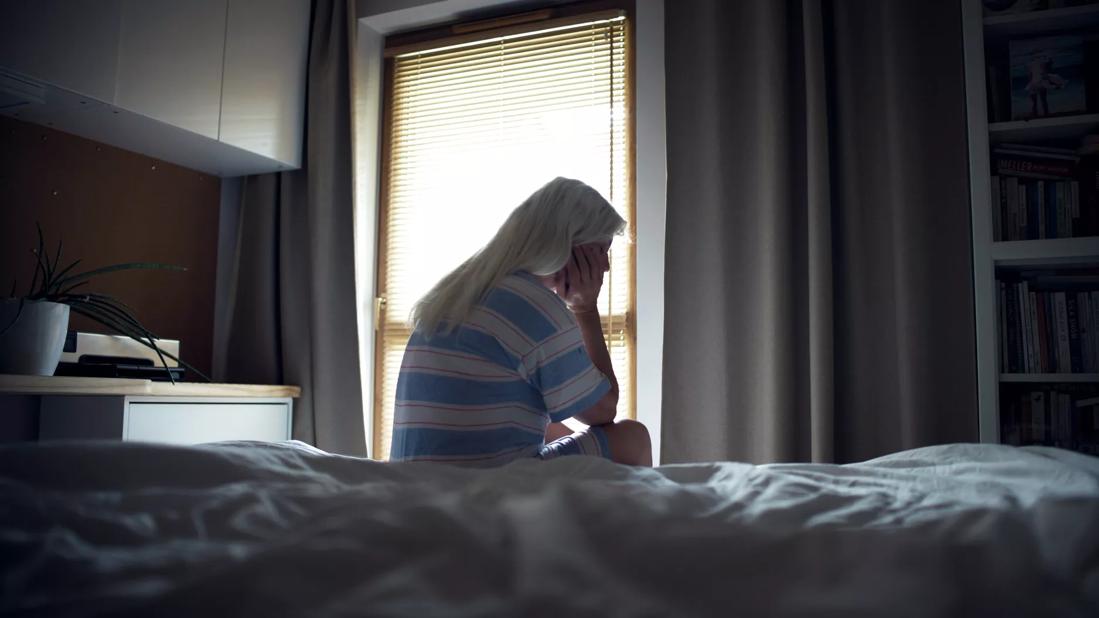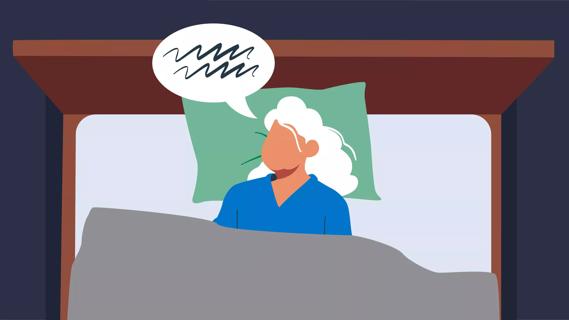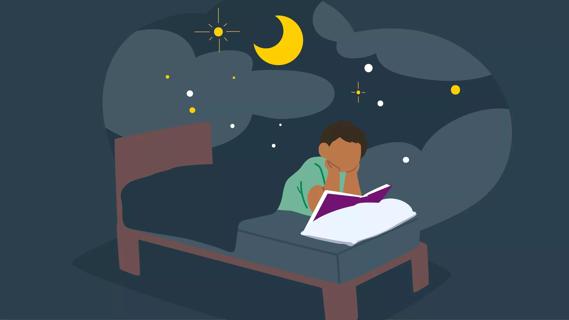Advertisement
Stress, weight gain and forgetfulness are just a few effects of losing sleep

Up to 70 million Americans are sleep-deprived. But those hours of lost sleep add up to a bigger health deficit than you may realize, says sleep medicine specialist Nancy Foldvary-Schaefer, DO, MS.
Advertisement
Cleveland Clinic is a non-profit academic medical center. Advertising on our site helps support our mission. We do not endorse non-Cleveland Clinic products or services. Policy
“Sleep is foundational to health and wellness,” Dr. Foldvary-Schaefer says. “We know that getting enough sleep and getting enough good sleep is necessary for cardiovascular health, metabolic health and even brain health.”
Exactly how is a lack of sleep harmful to your health? Let’s take a look at what happens to your body when you don’t get enough rest.
There are lots of reasons why you need sleep. It allows your body to:
“Sleep is an active process for every organ of the body, including the brain,” Dr. Foldvary-Schaefer says. “We need sleep so we can restore nutrients, clear toxic materials and recharge for the next day.”
Even missing as little as 1.5 hours can have an impact on how you feel, causing short-term problems like:
“During periods of sleeplessness, hidden health hazards accumulate that can’t be covered up with concealer or reversed with caffeine.” Dr. Foldvary-Schaefer notes. “Everything from your cardiovascular system to your immune system feels the impact.”
Beyond feeling groggy feeling and sleeping past your alarm, sleep deprivation affects many parts of your body and brain.
So, what exactly happens when you don’t get enough ZZZs? Let’s take a look at the many possible effects of sleep deprivation.
If your internal batteries feel depleted by the early afternoon, that’s a clear sign of lack of sleep — and no, a late-day cup of coffee won’t cure it.
“If you wake up in the morning and you aren’t refreshed, and you feel exhausted or are yawning excessively during the day, those are all signs of insufficient sleep or another sleep disorder,” Dr. Foldvary-Schaefer states.
Sleep deprivation causes fatigue, low energy and excessive sleepiness, which can affect your ability to do things you love and simply complete day-to-day tasks.
If you’re stumbling through the day with fewer than seven hours of sleep, you’re likely to start literally stumbling.
Advertisement
A 2021 study found that sleep deprivation had a significant negative effect on gait (the way you walk), while other studies have found that a lack of sleep can affect your sense of balance. Both can put you at risk for accidents, falls and injuries.
It’s no big revelation that a night of bad sleep can make you feel irritated, emotional and short-tempered the next day. And chronic sleeplessness can quickly morph into mental health concerns.
“Mood disorders like depression and anxiety are also connected with chronic insomnia and sleep deprivation,” Dr. Foldvary-Schaefer cautions.
For example, research shows that people with insomnia are twice as likely to experience depression. It also shows that about 80% of people with depression experience insomnia.
In other words, sleeplessness can be a symptom of mental health issues, but it can also be a contributor to them, which creates a frustrating chicken-and-the-egg cycle.
Wait, where did I put my keys? A lack of sleep affects your ability to remember and react, which can cause your brain to go blank on the most routine of tasks.
Deep stages of sleep are responsible for learning and memory. These include rapid eye movement (REM) sleep and deep non-REM sleep (also known as Delta sleep or slow-wave sleep, or SWS).
“When sleep is interrupted or cut short by going to bed too late or not getting eight hours in bed at night, your brain isn’t able to properly catalog its memories,” Dr. Foldvary-Schaefer explains.
She points to studies that show that students who pull all-nighters don’t do any better on their tests the next day: “Even though they’ve put in more hours, they’ve deprived themselves of the sleep that was needed to really ingrain those memories into their brains,” she says.
Sleep deprivation can also cause neurological disturbances like:
“Deep sleep allows our brains to clear the toxins that accumulate during our waking hours,” Dr. Foldvary-Schaefer explains, “so that we don’t develop neurodegenerative diseases like Alzheimer’s disease.”
Research shows that this process takes seven to eight hours (and sometimes more). In other words, if you’re losing sleep, so is your brain.
If you’ve ever walked into the office and been told, “You look tired!” (Ugh, rude) you know what we mean: When you don’t get enough sleep, it can show on your face.
Sleep deprivation can cause:
Advertisement
There’s also a link between lack of sleep and an increase in the amount of cortisol in your body. Cortisol can break down collagen, the protein that keeps skin smooth, which means a lack of sleep could mean more wrinkles.
When you burn the candle at both ends, your immune system takes a hit. You may be more prone to getting sick and slower to bounce back from viruses like the cold or flu.
That’s because when you sleep, your body produces cytokines, proteins that send signals to other cells to keep your immune system functioning (which is a good thing!). But when you’re sleep-deprived, your body instead starts to make more white blood cells. This creates an imbalance that weakens your immune system over time.
“After consecutive days of not getting enough sleep, you may start to become more susceptible to certain illnesses,” Dr. Foldvary-Schaefer explains. “Plus, as lack of sleep affects your immune system’s ability to fight against illnesses, it may take you longer to recover.”
In the short term, even a couple of bad nights’ sleep can make you feel hungrier — especially for sweets and snacks. And chronic sleep deprivation is a risk factor for weight gain and obesity.
Why? Lack of sleep disrupts these key hormone levels in your body:
Lack of sleep makes it harder to lose weight, too. A review of studies on sleep deprivation and weight found that people who got enough high-quality sleep were more likely to be successful in their weight loss efforts than people who were sleep deprived.
Are you stressed because you can’t sleep, or are you having trouble sleeping because you’re stressed? This is another “Which came first?” scenario with the same result: You, mega-frazzled and unable to catch that shut-eye you so desperately need.
It all comes back to cortisol, the stress hormone: Sleep deprivation may raise cortisol levels, which can contribute to weight gain, heart disease, anxiety, signs of aging and so much more.
“On the other hand,” Dr. Foldvary-Schaefer says, “a good night’s sleep naturally reduces cortisol levels.”
Sure, you wouldn’t drive while drunk, but would you drive while exhausted? You shouldn’t. Sleep deprivation puts you at a higher risk for car accidents.
Driving after 20 hours without sleep is like driving with a blood alcohol content (BAC) of 0.08%, the legal limit in most U.S. states. The National Highway Traffic Safety Administration reports that drowsy driving accounts for thousands of crashes, injuries and fatalities each year.
Not getting enough sleep also hurts your heart.
Advertisement
Sleep deprivation can lead to hypertension (aka high blood pressure). And one study found that people diagnosed with sleep deprivation have a higher risk of hypertensive heart disease, which is the result of long-term unmanaged high blood pressure.
Plus, untreated sleep apnea and other chronic sleep disorders put you at a higher risk for health conditions like arrhythmias (abnormal heart rhythm), obesity and Type 2 diabetes, which can all contribute to cardiovascular disease.
“Studies on these topics are all evolving, but there's a lot of evidence to suggest that short sleep — meaning less than seven hours on average for adults — is harmful to your health,” Dr. Foldvary-Schaefer says.
Chronic sleep deprivation is associated with an increased risk of other conditions, too.
“When your body doesn’t get the restoration it needs, that leads to a buildup of toxins and inflammatory markers that we believe underlie the development of a number of chronic diseases,” Dr. Foldvary-Schaefer warns.
Not getting enough sleep raises your risk for:
There’s good reason to teach kids healthy sleep habits from an early age: Chronic sleepiness in kids and teens has seriously dangerous effects on their development.
A lack of sleep can lead to:
Unless you’ve really been making a point to get enough sleep, chances are high that you’re not getting enough. Recent studies show that at least 30% of American adults are sleeping less than seven hours per night
But most people need at least that much, according to a report from the National Sleep Foundation. It breaks down sleep recommendations into nine age-specific categories, with a slight range that allows for individual preferences:
Advertisement
Genetic, behavioral and environmental factors help determine how much sleep each individual needs. But Dr. Foldvary-Schaefer says a minimum of seven hours of sleep for adults is a step in the right direction to improve your health.
If you eat well and exercise regularly but don’t get at least seven hours of sleep every night, you may be undermining all of your other efforts. And we’re not being dramatic! Sleep isn’t a luxury; it’s a necessity.
“Adults need seven to eight hours of sleep each night — not just once in a while,” Dr. Foldvarey-Schaefer says. “If you’re not getting that, you’re likely chronically sleep deprived. It’s the most common cause of tiredness in our society today.”
Here’s how to start taking steps to get better sleep:
Tried everything and still can’t seem to wake up well-rested? It might be time to bring in the professionals.
If you snore (or suspect you do) or otherwise just can’t seem to get a good night’s sleep, make an appointment to chat with a healthcare provider. They may recommend a sleep study to rule out any sleep disorders and get to the root of the problems — so that you can finally start getting the beauty rest you reserve.
Learn more about our editorial process.
Advertisement

From newborn through teen years, your child’s sleep needs will change

Sleeping with separate blankets can help you get the ZZZs you need — without fighting for covers all night

Stress, alcohol, sleep apnea and (you guessed it!) scary movies are a few common causes of bad dreams

Regular exercise, an iron-rich diet, adequate sleep and bedtime routines that include a warm bath or massage may help with your kid’s RLS

Recording your dreams may help you become more mindful, understand your thought patterns, process your emotions and even reduce your stress

Chamomile, lavender and valerian root teas may offer a faster route to dreamland

Many factors can contribute to sleep talking, like stress or anxiety, lack of or low-quality sleep, or even more serious sleep-related conditions

A consistent, structured routine, which may include incentives, can help children learn to stay in bed and get the ZZZs they need

Focus on your body’s metabolic set point by eating healthy foods, making exercise a part of your routine and reducing stress

PFAS chemicals may make life easier — but they aren’t always so easy on the human body

While there’s little risk in trying this hair care treatment, there isn’t much science to back up the claims